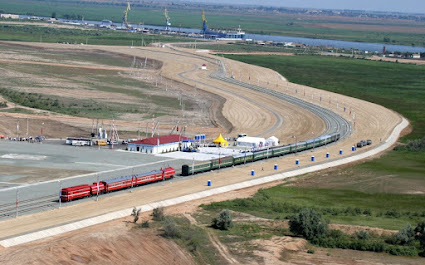The International North-South Transport Corridor (INSTC) is a 7,200-km-long multi-mode network of ship, rail, and road route for moving freight between India, Iran, Afghanistan, Azerbaijan, Russia, Central Asia and Europe.
Last week, India urged Iran to activate the 7,200 km International North-South Transportation Corridor (INSTC), The Tribune newspaper reported.
With this development, India's trade with Russia is set to take a turn toward becoming much cheaper and faster as the two nations are planning to establish a corridor that passes through Iran and facilitates transport between them.
The INSTC is a transportation network that includes sea, road, and rail routes and links Russia and India, with Moscow and New Delhi seeking to activate the route due to them upping their bilateral trade by up to $13 billion in the last quarter of 2021. The trade even increased in terms of oil and other commodities.
Several central Asian countries will benefit from trade via the INSTC, such as Armenia, Azerbaijan, and Georgia.
Dry runs have shown transit time decreasing by up to 25 days from 40-45 days on this route, which would cut transportation costs by 30%. The INSTC is also not under any sanctions since it is an alternative to the Suez Canal, and it is not dominated by Western countries.
Iran declared on Thursday its readiness to employ its capacities to contribute to the establishment of sustainable peace in the South Caucasus region, which includes Armenia, Azerbaijan, and Georgia.
The Secretary of Iran's Supreme National Security Council, Ali Shamkhani, called for establishing agreements that will lay down the groundwork for an increase in the volume of economic exchanges between the two neighboring countries considering their significant potential.
"Interestingly, all 18-odd countries touched by the INSTC route have never been active backers of unilateral sanctions announced periodically by the West," The Tribune reported. Trade links within the region have been disrupted due to the unilateral sanctions imposed on Russia and Iran.
Meanwhile, The Economic Times reported that Russia had started transporting container trains to India through the eastern branch of the INSTC.
The INSTC, if activated, could become an alternative to traditional routes such as the Suez Canal, the Mediterranean Sea, and the Bosporus strait.
India also called on Iran to include its Chabahar Port to be brought under the INSTC, which would provide sea access to Afghanistan and emerge as a commercial transit hub for the region.
India has highly close ties with Iran, mainly due to New Delhi's dependence on Iranian crude oil despite the US sanctions on Tehran. The Islamic Republic also enjoys pivotal geographic importance, as it provides an alternate route to Afghanistan and Central Asia without India having to resort to Pakistan, a nation whose ties with New Delhi are frayed.





















No comments:
Write comments